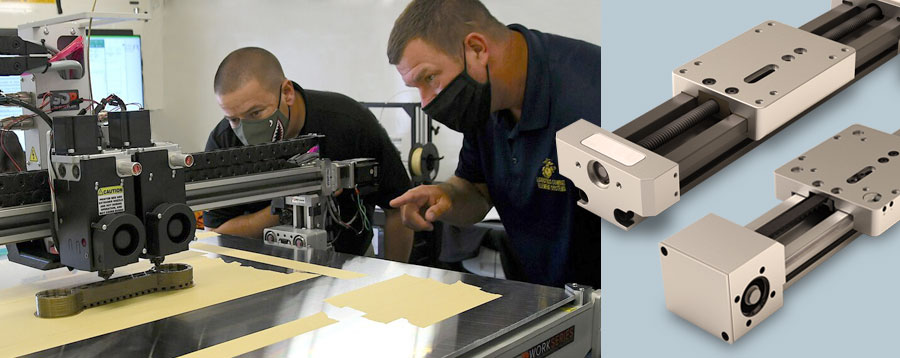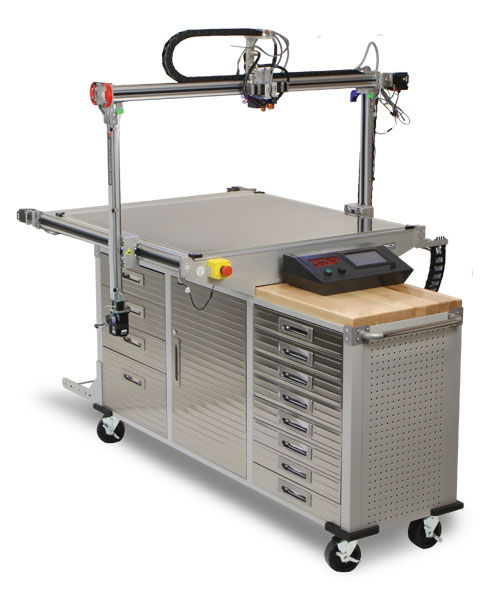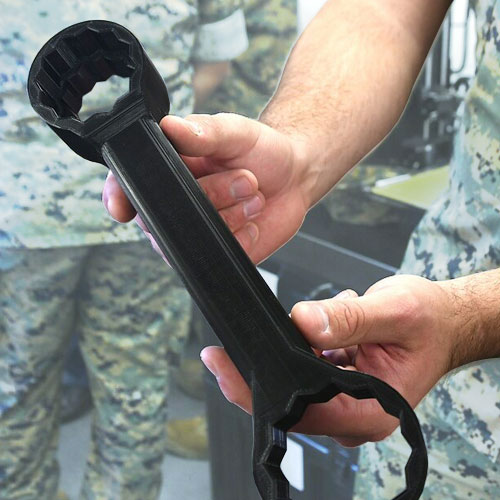
MCTSSA, or Marine Corps Tactical Systems Support Activity, provides directional support to the Marine Corps and Joint Service command, control, computer, communications, and intelligence (C4I) architecture. The MCTSSA does this through communications exercises, cyber testing, tactical networking, and more. Recently, the MCTSSA hosted a team of design experts responsible for testing the network connectivity of XFAB, also known as the portable expeditionary fabrication lab. This lab is essentially an additive manufacturing hub that can be readily deployed for support maintenance duties that include fabrication and repair or modification of equipment. It features one of our 3D Platform brand of large format printers, the 300 Series Workbench Pro. In addition, PBC Linear provides the industrial strength mechatronics for this industrial printer, helping deliver superior performance and reliability.
XFAB is a transportable and self-contained, additive manufacturing lab that can be deployed with battalion-level Marine maintenance units. The lab is 20-by-20 feet and is collapsible for easier transport. Inside there are five 3D printers including two desktop printers, two industrial carbon fiber printers, and our 3D Platform 300 Series large format printer. In addition, the lab includes laser scanners and cutters, and a corresponding computer design software system.
The XFAB container is powered by a generator or shore power, and can be set up or torn down by a team of four Marines in roughly two-to-three hours. Its weight, when fully equipped, tops the scales at about 10,500 pounds and can be transported via the Logistics Vehicle System Replacement or a typical commercial flatbed truck.
XFAB has been in development for over five years, and will eventually provide Marines with an opportunity to fabricate their own manufacturing tools, parts, and signage. This unique capability will offer much-needed support in forward-deployed expeditionary environments where specialty and hard-to-find parts are not readily available.

The 300 Series large format printer from 3D Platform offers the highest print volume dimensions of the group, with a robust 1000 mm x 1000 mm x 700 mm (0.7 m³, 1.4×). It is built with linear motion hardware that includes SIMO Series actuators from PBC Linear. Each actuator that moves along the X-Y-Z gantry is customized and incorporates Constant Force™ anti-backlash lead screws and nuts for simultaneous high precision and strength.

SIMO is an acronym for Simultaneous Integral Milling Operation. It is a process developed and patented by PBC Linear that has revolutionized traditional machining. The SIMO process uses synchronized cutters, eliminating built-in extrusion variances by machining all critical edges concurrently in one pass. This ensures tight tolerances, limited variance, and a remarkably straight and repeatable surface at minimal additional cost. This process is used on both our plain bearing Gliding Surface Technology and related actuators, as well as cam roller V-guide bearings.
The SIMO process offers many advantages to the standard aluminum extrusion process. The twist and flatness are generally two times better than standard aluminum extrusions, with the straightness (camber) reaching six-times that of standard extrusions.
The testing event at MCTSSA included senior leaders and Marines from 1st Marine Logistics Group, 1st Light Armored Reconnaissance Regiment, 3rd Amphibious Assault Battalion and 3rd Marine Aircraft Wing. The demo offered them a first-hand look at the equipment and how they can manufacture parts and products. The main goal of this event was to first evaluate the connectivity of the Marine Corps’ closed computer network and then determine if any adjustments are needed. The ultimate objective is to reach final operational capability and then begin delivering labs to the Fleet Marine Forces by June 2022.

U.S. Marine Cpl. Tyler Anglin from 1st Maintenance Battalion holds a 3D printed universal load stud wrench during a demonstration event at Marine Corps Tactical Systems Support Activity. This and the top photo by Amy Forsythe / U.S. Marine Corps.